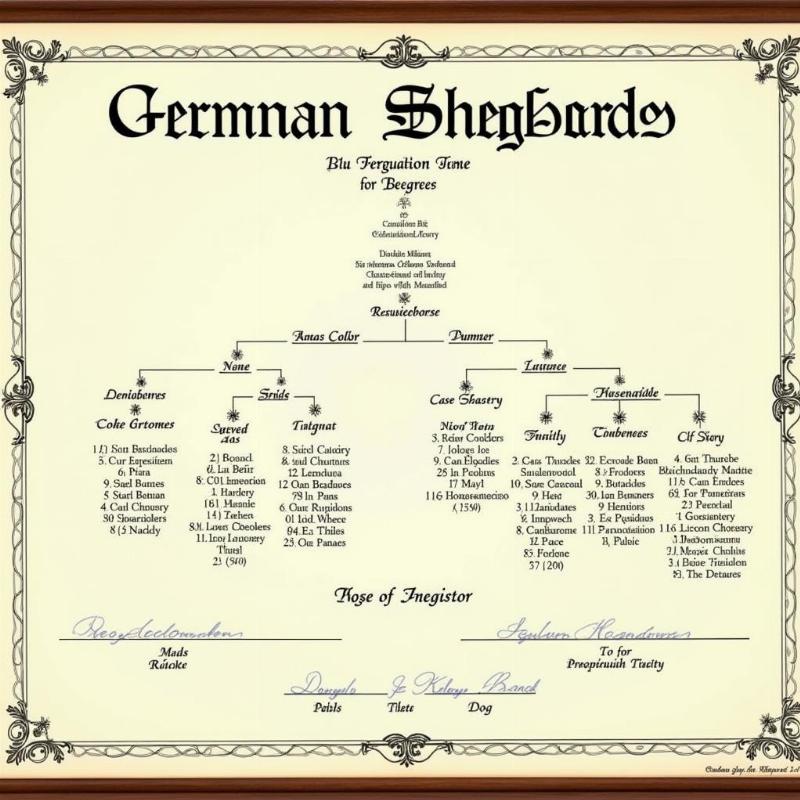Understanding the intricacies of a German Shepherd Dog’s pedigree is crucial for responsible breeding and ownership. A well-maintained german shepherd dog pedigree database provides invaluable insights into a dog’s lineage, health history, and temperament traits. This guide will delve into the significance of these databases, how to navigate them, and what to look for when researching a German Shepherd’s ancestry.
Why is a German Shepherd Pedigree Database Important?
A pedigree database is essentially a family tree for your dog. It documents generations of ancestors, offering a wealth of information crucial for responsible breeding practices and informed ownership decisions. By accessing a reliable german shepherd dog pedigree database, breeders can make informed choices to minimize the risk of inherited health issues and promote desirable traits. For prospective owners, a pedigree can shed light on a dog’s potential temperament, physical characteristics, and overall health predispositions.
 Example of a German Shepherd Pedigree Certificate
Example of a German Shepherd Pedigree Certificate
Navigating a German Shepherd Dog Pedigree Database
Several reputable organizations maintain german shepherd dog pedigree databases. These resources often require membership or a fee to access detailed information. Some prominent examples include the American Kennel Club (AKC) and the United Kennel Club (UKC). These databases allow you to search by registered name, registration number, or even by breeder. Once you’ve located the dog you’re researching, the database will typically display a multi-generational pedigree chart.
Key Information to Look For in a Pedigree
When reviewing a German Shepherd’s pedigree, certain details are particularly important:
- Hip and Elbow Scores: These evaluations indicate the dog’s susceptibility to hip and elbow dysplasia, common genetic conditions in German Shepherds.
- DNA Testing: Information on DNA testing for specific genetic diseases can help predict a dog’s health risks.
- Titles and Achievements: Titles earned in various canine activities (e.g., conformation, obedience, Schutzhund) can indicate a dog’s temperament, trainability, and working abilities.
- Linebreeding and Inbreeding: Note any instances of close relatives being bred together. While careful linebreeding can reinforce desirable traits, excessive inbreeding can increase the risk of genetic disorders.
How to Interpret a German Shepherd Pedigree Database
Interpreting a pedigree requires more than just reading names and dates. Understanding the relationships between ancestors and recognizing patterns in health and temperament traits is crucial. For example, if multiple dogs in a lineage suffer from the same genetic condition, it indicates a higher risk for offspring. Similarly, consistent achievements in specific canine activities can suggest a strong predisposition for those traits.
The Importance of Responsible Breeding Practices
Responsible breeders utilize german shepherd dog pedigree databases as a tool to make informed breeding decisions. By carefully selecting breeding pairs based on pedigree information, they strive to minimize the risk of inherited health problems and maximize the expression of desirable traits. This meticulous approach contributes to the overall health and well-being of the German Shepherd breed.
Conclusion
The german shepherd dog pedigree database is an indispensable resource for breeders and owners alike. By understanding how to navigate and interpret these databases, you can gain invaluable insights into a German Shepherd’s ancestry, health predispositions, and potential temperament. This knowledge empowers responsible breeding practices and informed ownership decisions, ultimately contributing to the health and well-being of this magnificent breed.
FAQ
-
What is a German Shepherd pedigree database? A pedigree database is a comprehensive record of a dog’s ancestry, providing information about its parents, grandparents, and further generations.
-
Why is it important to check a German Shepherd’s pedigree? Checking a pedigree can help identify potential health risks, predict temperament traits, and inform breeding decisions.
-
Where can I find a reliable German Shepherd pedigree database? Reputable organizations like the AKC and UKC maintain reliable pedigree databases.
-
What should I look for in a German Shepherd’s pedigree? Look for hip and elbow scores, DNA test results, titles and achievements, and any instances of linebreeding or inbreeding.
-
How can I interpret the information in a pedigree? Look for patterns in health and temperament traits across generations, and consult with experienced breeders or veterinarians for guidance.
-
How does a pedigree database contribute to responsible breeding? Breeders use pedigree information to make informed decisions about breeding pairs, minimizing health risks and maximizing desirable traits.
-
Is it important for pet owners to understand a dog’s pedigree? Understanding a dog’s pedigree can provide valuable insights into its potential health and behavior, leading to more informed care and training decisions.
Beautdogs.us is your premier online destination for all things German Shepherd. We offer expert advice on breed-specific care, training, and health, along with a curated selection of products tailored to meet your German Shepherd’s unique needs. Whether you’re a seasoned owner or just starting your journey with this remarkable breed, Beautdogs.us provides the trusted resources you need. Contact us today at [email protected] or call us at +1 501-555-7529. Beautdogs.us is here to help you and your German Shepherd live a happy, healthy life together.